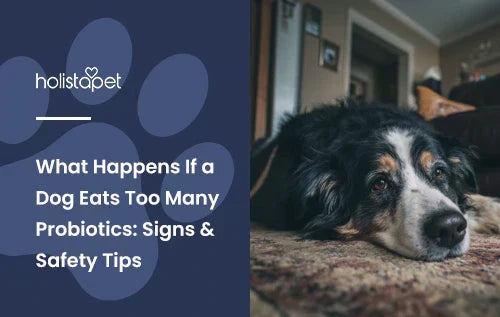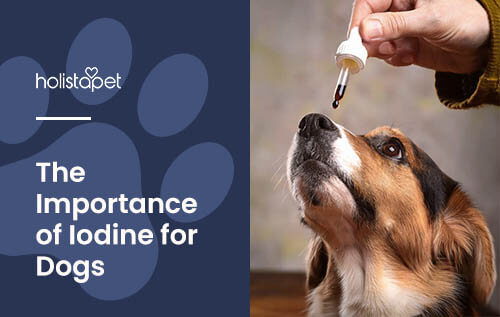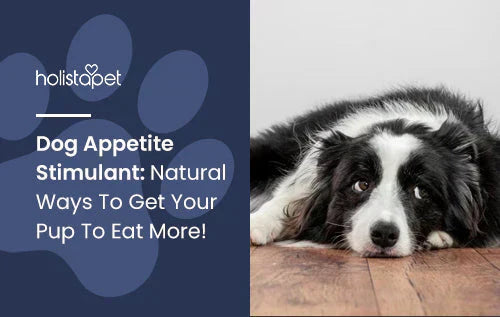What happens if a dog eats too many probiotics? The short answer: Their stomach might throw a little protest party. A canine's digestive system loves balance, and too many probiotics can tip the scale.
Your puppy may occasionally deal with an upset stomach, gas, or diarrhea. While these digestive issues can be stressful, most dogs recover fast. By following a consistent wellness routine, you can keep your pet’s gut health stable, balanced, and energetic.
Why Give Dogs Probiotics in the First Place?

Dog probiotics support more than just the stomach. Aside from aiding digestion, they can also support the immune system. Probiotic supplements add good bacteria to the gut to help keep harmful bacteria from taking over. Pet owners like them because they can support smooth digestion, internal balance, and more.
- Supports Digestion. Probiotics for dogs keep the canine digestive tract steady and regular.
- Immune System Support. Friendly bacteria play a role in immune health.
- Balanced Gut Flora. Beneficial microorganisms keep the dog's gut in balance.
- Support for Allergies. Some strains may reduce allergic reactions.
- Overall Wellness. A steady probiotic routine may boost a pup's health and wellness.
How Probiotics Support Digestive Health
Probiotics act like small helpers in the gut. They add good bacteria that balance harmful bacteria. This state of harmony supports nutrient absorption and keeps digestion steady. Probiotics also help make short-chain fatty acids that protect the intestines.
Owners often notice healthier stool and fewer stomach issues during their pet's probiotic intake. With a steady routine, many companion animals enjoy smooth digestion and strong gut health that shows in their daily comfort.
Can Dogs Have Too Much Probiotics?
Yes, our canine friends can have too much probiotics. While probiotics add beneficial bacteria to the digestive system, too many strains can actually end up upsetting the stomach. An overdose may bring discomfort like gas, bloating, or loose stool.
Dosing probiotics for dogs should always match the animal's size and needs. When probiotic supplements go past what their system can handle, digestive harmony takes a hit. Owners should keep their probiotic products in check to support good digestion without causing adverse effects.
What Is Too Much Probiotics for Dogs?
Too much probiotics for dogs means giving more than their system can manage. Supplementation should match the pup's size, age, and strains used. A small pooch may only need a fraction of what a large breed can handle.
Most probiotic options include serving ranges on the label. Following those guidelines keeps intake safe and steady. Dog owners who guess at amounts or provide more than suggested limits risk overdose. Always match dosage with the pet's condition and keep adjustments gradual.
What Can Happen If a Dog Eats Too Many Probiotics
If a dog eats too many probiotics, their digestive tract often shows it first. Probiotics work best in balance, but too many strains may overwhelm the gut. This imbalance can trigger gas, bloating, or loose stool that makes them uncomfortable.
Pet owners might also notice changes in appetite or mild agitation. In rare cases, severely immunocompromised dogs could face bigger problems tied to immune disorders. Most healthy pups bounce back, but it's better to avoid these issues from the get-go.
Digestive Issues
Too many probiotics in a dog's gut can stir up their digestive system. Instead of supporting digestion, the overload may bring gas, bloating, or loose stool. The stomach might gurgle more than usual, and nutrient absorption may slip off track.
Some strains cause puffiness or irritation when given in excess. Restlessness after heavy intake may also happen. Being mindful of dosing helps avoid digestive disorders and maintain steady gut health.
Appetite Changes or Discomfort
When probiotic intake goes overboard, a dog's appetite may shift. Some pups eat less, while others may beg for food more often. These changes signal that the digestive system feels unsettled. A dog's stomach may feel sore, making meals less appealing.
Other signs include licking lips, pacing, or mild whining linked to stomach upset. Dog probiotics meant to support canine digestion can backfire if serving sizes climb too high. Watching closely helps catch these small red flags early.
Rare but Possible Immune or Gut Imbalance
Too many probiotics can sometimes push a dog's gut health in the wrong direction. Instead of helping, probiotics may upset the balance of good bacteria and harmful bacteria. This shift may open the door to adverse reactions in sensitive canines. In rare cases, severely immunocompromised dogs might face bigger risks linked to immune system disorders.
Remember, a dog's gastrointestinal tract works best with steady levels of beneficial microorganisms, not an overload. Owners should stick to safe doses to protect their pet's immune health and overall wellness.
Signs Your Dog Had Too Many Probiotics
A dog's digestive condition can send signals when probiotic intake goes too far. Gas, loose stool, and queasiness often top the list of signs. Some pups may show reduced appetite or mild irritation. Others might act restless because their tummy feels off. Pet parents who spot unusual behaviors or physical changes should pay close attention and speak to their vet.
Behavioral Changes to Watch For
Too many probiotics may cause your dog to act a little differently. Watch for subtle shifts in behavior that point to digestive discomfort or gut imbalance. These changes can show up quickly and offer early warning signs:
- Restlessness. Pacing or trouble settling down signals stomach troubles.
- Excessive Licking. Dogs may lick their lips or paws when upset.
- Whining or Vocalizing. Extra noises can point to irritation or soreness.
- Lower Energy. A normally playful pup may seem less active.
Physical Symptoms in Mild vs. Severe Cases
Dogs that eat too many probiotics often show physical symptoms first. Some cases stay mild, while others may grow more serious. Watching your pup closely helps you spot the difference.
- Mild Physical Symptoms. Gas, bloating, loose stool, or queasiness that clears up in a short time.
- Severe Cases. Ongoing diarrhea, vomiting, swelling in the stomach, or major appetite loss that signals a bigger problem.
What To Do If Your Dog Eats Too Many Probiotics
If a dog eats too many probiotics, the first step is staying calm and watching closely. Most pups only deal with mild digestive issues that pass in a day or two. Still, paying attention helps you spot whether your furry buddy needs extra care.
Dog owners should also track stool, appetite, and energy levels after a case of probiotic overdose. Keeping supplementation paused for a short time can help the digestive tract settle. If symptoms stick around or grow worse, it's time to seek help.
When To Monitor at Home
Many dogs only show mild signs after too many probiotics, so home monitoring often works. Owners can keep track of stool, appetite, and overall energy while waiting for their pet's stomach to calm. Most pups bounce back once their system clears the extra probiotics.
Offer fresh water and stick with a simple diet during recovery. Avoid giving more probiotics until the digestive tract feels normal again. If discomfort lingers longer than expected, call your vet.
When To Call the Veterinarian
Some canines need more than at-home care after a case of probiotic overdose. Call the vet if your pup has nonstop diarrhea, vomiting, or swelling in the stomach. Severe loss of appetite or rapid weight changes also raise red flags.
Dogs with immune system disorders or seniors may face bigger risks. Vets, with their expertise, can guide safe probiotic dosing and rule out serious issues. A quick call gives peace of mind and keeps your pet's health on track.
Proper Use and Safe Dosage Suggestions
Your dog's probiotic dosage should always fit their size, age, and digestive health needs. A small pup may only need a pinch, while larger dogs can handle higher servings. Following safe ranges helps support proper digestion without risking overdose.
Dog owners should also choose probiotic products made for pets, not for humans. Look for clear instructions on serving size to keep intake steady and effective. Keep dosage consistent to give your dog's gut microbiome time to adjust and benefit fully.
Starting Small and Adjusting Gradually
When starting probiotics, ease them into your pet's diet little by little. A sudden overload can upset the digestive system instead of helping it. Beginning small lets your pup's gut bacteria adjust without stress.
Pet owners can slowly raise the serving size over several days. This steady approach supports proper digestion and lowers the risk of stomach issues. With time, your dog's system can adapt, and probiotics can bring steady benefits.
Following Vet or Product Guidelines
Safe probiotic habits start with following clear directions from your vet or trusted products. Each probiotic routine includes serving details based on the pet's size and weight. Skipping or guessing at amounts raises the chance of discomfort and adverse reactions.
Veterinary guidance keeps probiotic supplementation tailored to your dog's condition. Product labels also show strains and strength for proper serving. Sticking to these rules supports healthy digestion and keeps the gut microbiome in balance.
How To Avoid Giving Dogs Too Much Probiotics
Pet parents can prevent probiotic overdose by reading product labels with care. Serving directions show how much probiotics match a dog's size and weight. Skipping this step raises the risk of upset stomach and digestive disorders.
Choosing trusted, high-quality probiotic products also makes a big difference. Look for clear strains, stated CFU (colony-forming units) counts, and safe ingredients fit for canine pets. These details show the product is thoughtfully and carefully crafted for pet wellness.
Featured Product: HolistaPet Probiotics for Dogs
![Probiotics For Dogs [Soft Chews] - HolistaPet](https://cdn.shopify.com/s/files/1/0765/3946/1913/files/Probiotic-Infographic-1_472d7a29-e30c-435a-9638-1365d8c3a9f9.jpg?v=1725384841)
HolistaPet's Probiotic Soft Chews for Dogs offer a tasty and balanced way to support gut health. Each soft chew carries nine probiotic strains with three billion CFU, perfect for maintaining healthy digestion. These tasty bites help restore balance in the gastrointestinal tract and keep puffiness or irritation at bay.
With pumpkin and sweet potato for flavor, pups enjoy every bite. Pet owners love that one bag covers 30 days for dogs of all breeds and sizes. This probiotic regimen boosts overall wellness, too, while keeping your furry friend's stomach feeling steady.
FAQs – Probiotics and Dogs
Probiotics for dogs play a role in digestion, immune system strength, and general well-being. Still, many pet parents wonder how much to give, what type works best, and if side effects happen. This section answers the most common concerns about dog probiotics, from safe dosage to daily routines and more.
How do I know how much probiotic to give my dog?
The right probiotic dosage depends on your dog's size, age, and health needs. Small breeds often need a much lower amount than large ones. Product labels typically list serving suggestions that keep probiotic supplementation safe and balanced. Your trusted veterinarian can also guide you on amounts if your dog has special conditions.
Following expert direction prevents overdose and keeps everything steady. Starting probiotics slowly and sticking with safe serving ranges supports healthy digestion long term.
What is the best type of probiotics to give dogs?
The best probiotics for dogs come from products made specifically for canine consumption. Human probiotics don't always match the canine digestive system, so they may cause issues. Dog owners should look for probiotic strains that support a balanced gut flora in canines.
High-quality probiotic products, like HolistaPet's, clearly list strains, CFU counts, and safe ingredients. These details prove they can benefit our canine friends specifically. Choosing probiotics designed for dogs keeps their digestive health on track and boosts their overall well-being at the same time.
Can probiotics make my dog sick?
Probiotics can make a dog sick if they get too much or the wrong kind. An overload may upset their stomach and bring queasiness, gas, or loose stool. Some pups also show reduced appetite or mild agitation from probiotic overdose.
Most healthy dogs adjust once probiotic intake matches their needs again. Pet parents should watch closely for adverse reactions, especially with new probiotic products. If discomfort lingers or grows worse, calling the veterinarian is the safest step.
Are probiotics safe for daily use in dogs?
Probiotics are safe for daily use when given in the right amounts. Many dogs benefit from steady probiotic supplementation that supports their digestive health and gut bacteria balance. A regular probiotic regimen also helps maintain a healthy immune system.
The key is sticking with probiotic products designed for dogs and following directions. Owners who give the right amount often see healthy digestion and fewer stomach troubles. Daily probiotic use can benefit pups of all ages, including senior dogs.
What's the best way to introduce probiotics into my dog’s diet?
The best way to introduce probiotics is by starting small and going slow. A sudden load of probiotic strains can upset the digestive system instead of helping it. Beginning with tiny amounts allows the gut microbiome to adjust.
Mixing probiotic products with regular dog food makes serving easy and stress-free. Pet parents should watch their pup's health closely for changes in stool or appetite during introduction. Gradual probiotic intake helps build healthy digestion without causing upset stomach or irritation.
Final Thoughts on Feeding Too Much Probiotics to Dogs
Probiotics can benefit dogs by supporting their digestive health, immune strength, and overall well-being. But giving too much flips the balance and may bring queasiness, loose stool, or appetite changes. Keeping servings steady and watching your pup closely helps prevent probiotic overload.
HolistaPet's Probiotics for Dogs offer a safe, vet-approved way to keep dogs' gut health strong. With tasty chews packed with beneficial bacteria, they make daily care simple. Give your furry best friend the balance they deserve, and watch their health shine every day.


 CBD Oil for Dogs - Fast Acting
CBD Oil for Dogs - Fast Acting
 Chicken Flavored CBD Oil For Dogs - Easy Dose
Chicken Flavored CBD Oil For Dogs - Easy Dose
 Salmon Flavored CBD Oil For Dogs - Highly Rated
Salmon Flavored CBD Oil For Dogs - Highly Rated
 CBG Oil for Dogs and Cats - Loved by Thousands
CBG Oil for Dogs and Cats - Loved by Thousands





Leave a comment
All comments are moderated before being published.
This site is protected by hCaptcha and the hCaptcha Privacy Policy and Terms of Service apply.